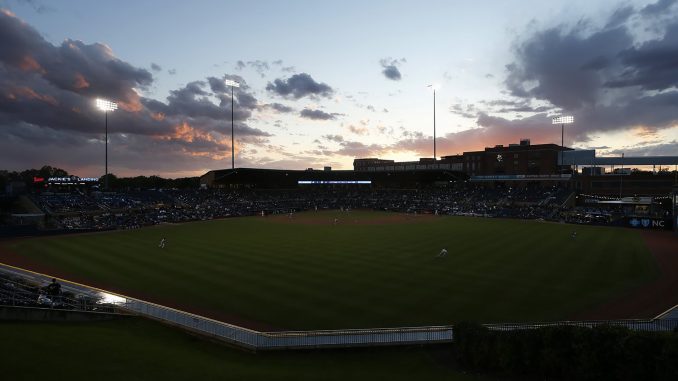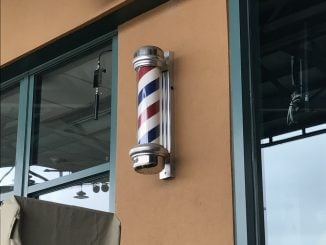
As Douglas Locascio looked out at a pristine green field under a bright Carolina blue sky last Thursday, his team’s scheduled opening day, the general manager of the Hickory Crawdads couldn’t help but think that it was a perfect day for baseball.
The only thing that was missing was the baseball.
Hickory’s L.P. Frans Stadium, like every other minor league ballpark in North Carolina, stands empty because of the coronavirus pandemic that has shut down all sports — along with virtually everything else in America — for the past month.
And, as Locascio points out, it could be well into the summer before the boys of summer and their fans are told it’s safe to play ball again.
“It’s bittersweet,” said Locascio of the unprecedented situation and the uncertainty surrounding it. “You try not to think about it because, ultimately, our biggest concern is the safety of our players, our fans and our country as a whole.
“You totally understand why we have to do what we do. But when you have that, it’s like, man, what could have been. How many people would have been here (on opening day) and what would the experience have been like?”
The Crawdads, a Class A affiliate of the Texas Rangers, are one of 12 minor league teams spread across the state from Asheville to Zebulon.
All of them are currently in a state of limbo, still preparing for a season that was supposed to begin last week without knowing when or if their efforts will be necessary.
In the meantime, they’re doing what they can to stay engaged with their fans and to help their communities in a time of national crisis.
The efforts have been as substantive as the Durham Bulls donating gloves and masks from their food service department to local hospitals to the diversion of online promotions similar to those staged between innings at the ballpark on game days.
“As soon as this situation happened, we took a few days to feel bad for ourselves,” said Mike Birling, the Bulls’ vice president for baseball operations. “Then we flipped the switch and went back into minor league baseball mode to help keep people uplifted in a time like this.”
To do their part, the Fayetteville Woodpeckers did a virtual opening day — complete with a simulated game broadcast and in-game features such as “kiss cam” and “fish or not a fish.”
“It was awesome,” said Mark Zarthar, president of the Carolina League team.
But only to a point.
The Woodpeckers were poised to build on the ultra-successful inaugural season they enjoyed both on the field and at the box office of its new state-of-the-art downtown Segra Stadium last year. Now, with the new season indefinitely on hold, they’re in danger of losing that momentum.
“The community responded so well to our project and our impact on downtown that we were looking forward to keeping the ball rolling,” Zarthar said. “This has certainly thrown us a bit of a curveball, you could say, into our initial success.”
While the Woodpeckers, along with everyone else, are feeling a financial pinch because of the crisis, they at least have the advantage of being owned by their parent team, the Houston Astros.
Not everyone is as fortunate.
Regardless of ownership, there are still bills to pay and obligations to be met with no revenue coming in to offset the costs.
“Right now we’re technically out of business,” said Wade Howell, general manager of the Kinston-based Down East Wood Ducks, the Carolina League farm club of the Texas Rangers. “Our core business is opening the games and having people buy tickets and concessions, and we can’t do that. Every day that goes by, obviously, that’s lost revenue.”
The timing of the shutdown only exaggerates the situation, according to the Crawdads’ Locascio.
“You’re a month away from your season opening, so all your promotional items, your giveaways, your merchandise has all been ordered,” he said. “So a lot of the expenses you could cut have already been accounted for. Major league teams can play on media deals, but we, as a business, rely on the fans for our revenue.”
About the only state team not sweating things out these days is the rookie league Burlington Royals, and that’s because their season isn’t scheduled to begin after the major league draft in June.
But even then, said general manager Anderson Rathbun, it’s still not business as usual.
“We have the luxury of time where our games aren’t affected,” he said. “But as far as getting people excited, getting new season ticket holders and community partners on board, we’ve kind of put a hold on that because we don’t feel it’s the best time to do that.”
And yet, despite the inactivity, teams have to be prepared to start back up as soon as the decision is made to relax social distancing orders and allow sports events to resume. That’s why few, if any, of the local teams have laid off their staffs.
So far.
The same can’t be said for the players, few of which in the minor leagues make a lot of money and many of which are suddenly worried about when their next paycheck will come.
For those in the Rangers’ organization — including those that will eventually be assigned to the Wood Ducks and Crawdads — the burden has been eased somewhat thanks to the generosity of Texas outfielder Shin-Soo Choo, who has pledged to donate $1,000 to each of his team’s 191 minor league players to help them make ends meet.
“Choo stepping up and doing that is huge,” Howell said. “Those (minor leaguers) are scrambling like everybody else. They’ve got car payments, insurance and whatever they might have, and they’re not getting paid if they’re not playing. So this is big for them to be able to stay in shape and focus on baseball instead of having to look around for other ways to pay the bills until it comes back.”
Whenever that might be.
“The light at the end of the tunnel is that when we do have those first games, it’s going to be even more special,” Locascio said. “That’s the driving force.”



